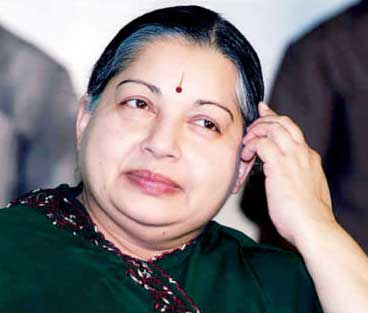The Supreme Court will hear on November 23 the Karnataka government’s appeal challenging the Karnataka high court verdict acquitting Tamil Nadu Chief Minister J. Jayalalithaa and three others in a corruption case of possession of disproportionate assets. A bench of Justice Pinaki Chandra Ghose and Justice R.K. Agrawal on Monday (October 12) adjourned the hearing as Karnataka government sought six weeks time to file its rejoinder to the reply filed by Jayalalithaa and others in pursuance to the notice issued by the court on July 27.
 Besides Jayalalithaa, the notice had also been issued to other accused N. Sasikala, V.N. Sudhakaran, and J. Elavarasi. Sasikala was a former aide of Jayalalithaa and Sudhakaran the AIADMK supremo’s disowned foster son.
Besides Jayalalithaa, the notice had also been issued to other accused N. Sasikala, V.N. Sudhakaran, and J. Elavarasi. Sasikala was a former aide of Jayalalithaa and Sudhakaran the AIADMK supremo’s disowned foster son.
The apex court on July 27 had also issued notice on the petition by DMK leader K. Anbazhagan and Bharatiya Janata Party leader Subramanian Swamy, both challenging the high court verdict acquitting Jayalalithaa.
In the Supreme Court on Monday, Senior Advocate L. Nageswara Rao represented Jayalalithaa. Karnataka Government was represented by Senior Advocate Dushyant Dave, who is also the SCBA President. Senior Advocate Aryama Sundaram appeared for six companies whose properties were attached in this case. Senior Advocate Vikas Singh appeared for DMK leader K. Anbazhagan.
It is noteworthy that in 2014, a trial court in Bengaluru sentenced Jayalalithaa to four years in jail and imposed a Rs.100 crore fine in the disproportionate assets case under Section 13(1)(e) of the Prevention of Corruption Act, 1988. But the Karnataka high court accepted Jayalalithaa’s appeal and acquitted her of all charges this year.
The high court had held that the value of Jayalalithaa’s disproportionate assets was much lower than Rs.53.6 crore which was computed by the trial court, held the amount “not enough” to convict here on corruption charges. Justice C.R. Kumaraswamy of Karnataka high Court had also acquitted the three co-convicts, sentenced to four years in jail and fined Rs.10 crore each for allegedly amassing wealth disproportionate to their known sources of income during her first term as chief minister from 1991-96.
The high court’s order was faulted for glaring arithmetical errors, especially in respect of details of assets, loan raised and income earned.
Jayalalithaa, who was elected from Srirangam in May 2011, had lost her seat and the chief minister’s post after the trial court’s verdict. She returned as chief minister after being acquitted.

